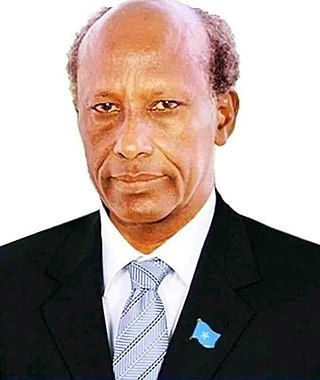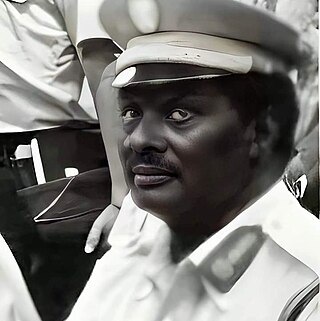
The Somali Armed Forces are the military forces of the Federal Republic of Somalia. Headed by the president as commander-in-chief, they are constitutionally mandated to ensure the nation's sovereignty, independence and territorial integrity.

Mohamed Farrah Hassan Garad, popularly known as General Aidid or Aideed, was a Somali military officer and warlord.

Mohammed Siad Barre was a Somali major general, politician and revolutionary who served as the third president of Somalia from 21 October 1969 to 26 January 1991.

Galkayo is the third-largest city in Somalia which serves as the capital of the north-central Mudug region. The city is divided into two administrative areas separated by a loose boundary.

The Hawiye are one of the principal and largest of the Somali clans, tracing their lineage back to Sheikh Ahmed Bin Abdulrahman Bin Uthman, also known as Sheikh Hawiye, the eponymous figure of the clan. They are considered the earliest documented clan to have settled in the Somali peninsula, as noted in the 12th century by Al-Idrisi, occupying the regions spanning from Ras Hafun to Merca, which served as their capital. Presently, the Hawiye reside in central and southern Somalia, Somaliland, Djibouti, the Somali region of Ethiopia, Harar, Oromia, and Afar regions, as well as Kenya. Furthermore, they represent the majority of the population in the capital city of Mogadishu.

The United Somali Congress (USC) was one of the major rebel organizations in Somalia. Formed in 1989, it played a leading role in the ouster of the government of Siad Barre in 1991, and became a target of the Unified Task Force campaign in 1993. Following infighting, the USC later splintered into smaller groups. By 2000, with the establishment of a Transitional National Government (TNG), a process of disarmament was put in motion and some moderate ex-USC leaders were incorporated into the new interim administration.

Mohammad Ali Samatar. was a Somali military officer, politician, former Commander-in-Chief of the Somali National Army, former Minister of Defence, former Vice President, former Deputy General Secretary of the Somali Revolutionary Socialist Party, and former Prime Minister. He was known for his intelligent military tactics in the 1964 Ethiopian–Somali Border War, Ogaden War and 1982 Ethiopian–Somali Border War.

The Rahanweyn, also known as the Digil and Mirifle is a major Somali clan. It is one of the major Somali clans in the Horn of Africa, with a large territory in the densely populated fertile valleys of the Jubba and Shebelle rivers and the areas inbetween, which are mainly inhabited by settlers from the Digil and Mirifle lineages.

Sheikh Hassan Dahir Aweys (English: Hassan Dahir Aweys (Somali: Xasan Daahir Aweys, is a Somali Islamist political figure.
The Somali Rebellion was the start of the Somali Civil War that began in the 1970s and resulted in the collapse of the Somali Democratic Republic in 1991. The rebellion effectively began in 1978 following a failed coup d’état and President Siad Barre began using his special forces, the "Red Berets", to attack clan-based dissident groups opposed to his regime. Backed by Ethiopia, the two earliest rebel factions, the Somali Salvation Democratic Front (SSDF) and the Somali National Movement (SNM) began attacks during the against government forces during the early 1980s.
The Somali National Front (SNF) was a politico-military organization that operated in southern Somalia during the Somali Civil War and represented one of the major factions involved in the conflict.
Over the course of the Somali Civil War, there have been many revolutionary movements and militia groups run by competing rebel leaders which have held de facto control over vast areas within Somalia.
General Ismail Qasim Naji in Borama, Somalia was the chief of staff of the Transitional Federal Government (TFG) of Somalia and currently the Somali ambassador in Oman. He has served as a senior officer of the Somali army since the administration of Siad Barre, who was removed from power in 1991. Before the formation of the TFG, he also commanded the army of the predecessor Transitional National Government (TNG) of Somalia between 2002 and 2004.

Osman Mahmoud is a Somali sub-clan and is one of the largest sub-clans within the larger Majeerteen Harti branch of the Darod clan. The sub-clan is most renowned for its rich history within Somalia, that of which include sultanates such as the Majeerteen Sultanate and Hobyo Sultanate.

Indirect presidential elections were held in Somalia on 30 January 2009. Due to the security situation in Baidoa, it was held in Djibouti. President Sharif Sheikh Ahmed won the election.
Salaad Gabeyre Kediye, also known as Salah Gaveire Kedie, was a Somali senior military official and a revolutionary who was executed by the Siad Barre regime.

Aden Abdullahi Nur "Gabyow". was a very senior Somali, Military Officer, Faction Leader, Politician, a leading member and one of the most powerful men in the Somali Democratic Republic.

The 1969 Somali coup d'état was a bloodless military takeover of the Somali Republic on 21 October 1969, led by Somali National Army officers of the Supreme Revolutionary Council under General Siad Barre. After the assassination of President Abdirashid Shermarke in Las Anod, the Somali National Army under Barre's command stormed Mogadishu, seized key government buildings, and demanded the resignation of the country's leaders. The coup deposed acting President Sheikh Mukhtar Hussein and Prime Minister Mohammad Egal, ushering in a 21-year military rule under Barre and the establishment of an authoritarian government that lasted until 1991.
The Political history of Somalia covers the development of the Somali government and institutional systems following the collapse of the Siad Barre regime in 1991.













